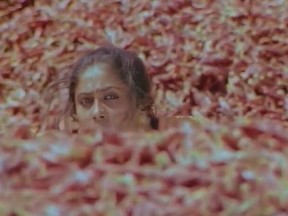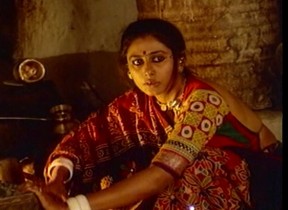Ketan Mehta’s Mirch Masala is an explosion of colours and cathartic vindication. Everytime I watch it, I remember something I had written a long time back about movies, “Living is not complete without imagining what we can be or should have been. The best kind of movies are the truths we wish we were living. They remind us to hold hands. To sing and dance. To love. To hold our peace. To vent. To go after what we want most in our lives. To be brave. To cry. Laugh. The craft of film making like any other craft is about holding up something that is shining and true and saying, “Do you remember this, recognise this? This is what it is all about. Beneath the everydayness of you and your life. This is where you should be. In a place where all things are possible. Where you can fly. Become new. Be anything…everything.”
I believe pain should be be used to create something bigger than pain. It cannot be an end in itself. Defeatist films or art or books do a disservice to the world by reinforcing the bad that we have all lived or read about in the papers. Pain cannot be a credo, a slogan, a code of honour because life is not futile. It is not pointless. It is not irredeemable. That is why I can’t bear films where pain and violation are like tunnels from which the stories never emerge. Films that say, “this is the only reality.”
Everyone who has ever been in this dark place called reality knows that to emerge from here into the light, you need to believe in the possibility of light. If you don’t, you are lost and sometimes when you can’t conjure that light, cinema does it for you. Hope is the only thing that has seen the human race through things like the Holocaust, the Partition, wars, riots, injustices, big and small. The role that cinema plays in looking at a world beyond the darkness, can never be underestimated.
Mirch Masala, no matter how many times I watch it, underscores decisively just how empowering films can be. And it is just so stunningly beautiful. To start with, there is the visual motiff of the red chillies. Glossily heaped across the canvas, spread over vast stretches, pounded and then transformed. The film is among other things about a woman’s right to her body and as the film progresses, the chillies soaking in the sun lusciously are trampled by horses, their heaps are used by a hunted woman to hide behind and they become metaphors of female sexuality, of rebellion.
The dialogue undermining women is both verbal, physical and implied in derisive gestures. The village chief (Suresh Oberoi) beats up his wife (Deepti Naval) when ever she wants to assert her right to think for herself and her daughter. A young, unmarried girl (Supriya Pathak) is beaten by her father for being impetuously in love. Sonbai (the glorious, unrepeatable Smita Patil) is talked down to because her husband has gone away to the city and she still won’t concede vulnerability.
Even the women, including the village matriarch (Dina Pathak) do not want any trouble with the menfolk and won’t stand up for any woman who dares to stand up for herself. A woman is blamed if she attracts attention, condemned if she rejects it. One of the village women (Ratna Pathak) goes to spend the night with the tax collector or Subedar (the eternally brilliant Naseeruddin Shah) because that is the safest, the easiest thing to do.
We realise that the film is about sexual violence, about power and gender politics in a world that wants to show women their place when we are placed right in the heart of a conflict that is as old as time. A woman whose husband is away and is now considered easy prey by the chauvinistic males running a village. And there is the lecherous, powerful man who wants her against her will. What a moment it is when Smita Patil’s gold flecked Sonbai locks defiant eyes with Naseeruddin Shah’s moustache twirling, manically violent, lip smacking Subedar.
After a few encounters when she refuses to give in to his advances, she is chased by a battalion of soldiers through the fields and dusty lanes of the village. She falls spectacularly in a mound of red chillies and then runs into the local masala factory where an old guard played with melting warmth by Om Puri guards the gates and the women inside.
The woman’s honour is dispensable. She is inconveniencing the whole village. She should willingly sacrifice her honour for the greater common good. The arguments lash against the factory walls but Sonbai and the old guard refuse to give in.
Om Puri does a bravura turn as a muslim guard whose creaking bones have more integrity than the entire village and he with his rickety rifle stands between Sonbai and utter and complete violation. In the end, the gates are stormed and for a moment the Subedar and Sonbai stand face to face measuring each other and then out of the womb of the factory, emerge a posse of women, carrying sheets heaped with red chilli powder. While Sonbai stands still and watches, the women who have never fought for themselves like she did, fight for her as they throw heap after heap of chili powder into the Subedar’s eyes to teach him a lesson he will never forget.
Impossible, right? Something like this would never happen in real life, many would argue but imagine a world where this was possible. Imagine if no Sonbai ever had to fight a battle alone? Imagine. Mirch Masala does more than just imagine such a world. It inspires you to create it.
Reema Moudgil is the author of Perfect Eight (http://www.flipkart.com/b/books/perfect-eight-reema-moudgil-book-9380032870?affid=unboxedwri )








Even as a kid i loved this movie. It said that a fight, a protest is possible no matter how powerless you may apparently be. A courageous will is all you need.
have watched 3 times till date and loved it every time. relived the experience through your words. thanks 🙂